- Home
- Joseph Bruchac
Two Roads Page 9
Two Roads Read online
Page 9
He waves a hand over his head. “Let’s go men, we done here.”
Pop and I stand stock-still, not moving a muscle as the sheriff and his posse of torch-bearing men depart. Nor do the other men of the camp stir from their places on their knees until the bobbing light of their torches can no longer be seen through the trees.
Cap is the first to stand.
“Buckets!” he yells, pointing at the little shack set on fire by Sheriff Boyle.
Men go scrambling in every direction, grabbing pails and throwing the water already in them onto the burning remains of what once was a bo’s home. Too late to save it, but soon enough to keep the fire from spreading to the other nearby shelters.
We pitch in to help. It takes a while, but eventually the last embers are out.
Through it all, there’s been no sign of Pop’s old war buddy.
“Go get the corporal?” I ask Pop as I stand combing the ashes out of my hair.
He tilts his head toward the woods. “You can try. But I expect he won’t be where you saw him. He’s used to making his way through enemy lines.”
When Pop says that, I get a quick glimpse of the future. I see Corporal Dart walking through the night. He’s moving fast, making his way cross-country with no hound on his trail. He’ll catch a northbound freight five miles away before dawn.
“You’re right, Pop,” I say.
“What’s that?” he says.
The bright half moon is at just the right angle now to light the spot where that pile of leaves and debris concealed the corporal. From the limb of an overhanging shrub there’s a glint of metal.
I walk over to look. The moonlight is bright enough for me to see what’s hung there. The France Victory Medal that was pinned on Corporal Esom Dart’s chest. I free it from the branch. It’s cool in my palm.
“Did he lose it?”
Pop shakes his head. “Nope, Cal,” he says. “Knowing Esom, he left it there for you. You helped save him. It’s yours now, son.”
CHAPTER
NINE
UPSIDE DOWN
We’ve managed to catch the very train my father was hoping we would. The two of us are possum belly on the roof of a westbound passenger car. We’re on our way to Challagi. Just one stop farther along the way according to Pop.
Normally I’d enjoy riding this way. It’s a fine sunny day. The air is warm and fresh as it washes over us. You have a great view from the top of a train car. But I can’t take any pleasure out of this ride right now. Not when my mind is going even faster than this train.
What I had overheard of the conversation Pop had with Sheriff Boyle last night has put unanswered questions into my mind. They’re all about Challagi, the place Sheriff Boyle mentioned and also called Plains View. What is it? Why did my father run away from it? Those questions and a dozen more are elbowing one another inside my head. There was no time last night to ask any of those questions, though. And this morning we had to hustle to make it in time to flip this ride.
Now, though it is just the two of us together, this is still not the time when I can ask questions. What with the train doing a good forty miles an hour, the wind whipping past us is too strong for any conversation at all.
I reach over and grasp my father’s arm. He turns his head to look at me. There are these hand signals he taught me, a whole bunch of them. Ones I guess he must have learned when he was over there in the war. I use a couple of them now. First, I tap my chest. That means me or I. Then, I hold my right hand up, palm out, and sort of waggle it back and forth. That means a question.
I have a question.
Pop lifts his own right hand, sticks out his index finger, and drops it down.
Yes.
He points with his lips behind us, where there’s a string of boxcars.
We make our way back, hop off our passenger car onto the one behind it, careful to land soft enough to not make any thumping sound that might attract the attention of a conductor. Most conductors don’t mind men hitching a ride. That is especially so because nearly all hoboes stay true to rule Number Eleven of the code, to always ride your train respectfully and never interfere with the operating crew.
But there are some conductors who have a mean streak in them and will kick off even the most polite of us. So we try to go unnoticed as much as possible.
The first boxcar we reach has its door shut tight. As does the next. But the third car’s right side door is half open. Even better, it is empty. The straw in the stalls and the lingering scent of livestock tell me horses were recently transported in here. So we watch our step as we make our way over to a couple of wooden boxes to sit on. Sort of like Cap’s packing crate, though all that’s under our seats are loose hay and a scatter of oats.
Pop looks at me, waiting. But now that it’s quiet enough to talk I feel hesitant.
I take out my comb and run it back through my hair a dozen times on each side. You never need put a drop of oil on your hair if you just comb or brush it regular. The natural oils in your scalp are all you need. That is what Mom taught me.
I put the comb away, rub my hands together. I have never been much for words—as far as saying them goes. Right now it’s harder than usual to speak. Finally I just blurt out what’s on the top of my head.
“So I’m Indian?”
“Half,” Pop replies. “As you know, your mom was Armenian, though that was about all we knew, what with her being an orphan. You are half Creek Indian.” Half Indian? What does that even mean? It feels like a rock I didn’t know I’d swallowed is stuck in my gut.
Some things are making sense, though. Like the stories Pop told me—stories that he said I shouldn’t ever share with anyone else. Were those Indian stories? Or all the things Pop knows about plants and nature, things he learned from his parents. Those must have been Indian things. Creek Indian, he said. And the sign language he taught me that was supposed to just be shared between the two of us. Was that Indian, too? It’s all too much for my brain to hold all at once. I can feel my heart pounding.
I breathe in and out real slow, trying to calm myself down. Maybe I should just focus on where Pop said we’re headed.
“Challagi?” I finally ask.
The great thing about talking with Pop is that I never need to say much for him to understand me. Just speaking that one word is enough.
“Challagi Federal Agricultural Indian Boarding School,” he says. “Some call it Plains View. Challagi’s how you say Cherokee in Choctaw. Sort of an insult—seeing as how it means cave dwellers. Folks without real houses.” Pop shakes his head. “Naming a school for the way one tribe insults another? Just what you’d expect from Washington.”
He picks up a handful of hay from the floor, selects three long pieces, and begins braiding them together.
“It was founded back in 1890. Idea was to teach us useful trades. Academic classes half the day, and the other half of the day industrial. Farming, barbering, harness making, printing, baking, masonry, and the like for us boys. Domestic trades for the girls such as sewing, housekeeping, and cooking. Boys and girls brought from more than forty tribes, mostly from Oklahoma. Every age from first graders to high school. Though now it is mostly seventh grade and up. Which makes it all right for you, Cal, seeing as how you finished sixth.”
I take a deep breath.
“Why’d you run away?”
Pop takes a long look at me.
“Good question, son. No, it was not at all perfect. I’d say that most of us didn’t really want to be there. Running away was something a good many did or planned to do one time or another. Me, I ran away three times during the five years I was there. First time was right after I got there. They caught me that time and brought me back. Second time was during my third year there. That time, though, I came back on my own. My family was all gone by then, and I realized that what family I had by then were the fri
ends I’d made at Challagi. Those boys in our Creek gang were some of the best buddies I ever had. The third time I ran, I joined the army—and found another sort of family there.”
Pop pauses, but not to make sure I’m listening. He knows I’m hanging on his every word. It seems to me he’s pausing because talking about this is bringing it back to him. He’s not enjoying it any more than he enjoys digging up the memories of his time in the trenches.
“Why did we run?” he repeats. “A good part of it was the discipline.” Pop places his hand on my arm, the way he always does when whatever he says has special meaning. “I doubt it’s that bad now since the Meriam Report.”
What kind of discipline? And what’s the Meriam Report.
“Some white folks,” Pop says, “work at Indian boarding schools like Challagi because they want to help us. They care about Indians. They may look at us as ignorant savages, sure. But they’re good-hearted—even if their eyesight is not so hot. And some teach things we can really use, especially about farming.”
Pop shakes his head and a new tone comes into his voice, one I seldom hear. Anger.
“But real bad things were happening. A government commission investigated the Indian schools. Indian schools were supposed to civilize us, make us like other Americans. At some schools they were killing us. Indian kids were being starved. Freezing in poor housing. Getting beat almost every day. In some Indian schools there were more names on the school gravestones than the rolls of those who graduated. That’s what the Meriam Report said.”
Pop pauses. He looks far off, not at the landscape whizzing by or at anything in particular. Just staring into space as he does at times when he’s upset and trying to calm himself. Then he clears his throat and looks back at me.
“Cal, I never planned having you go to an Indian boarding school.”
He shakes his head. “But now . . .”
He looks back into that distant place his mind goes when he is thinking or remembering. “You’re tough, son. You’ve seen a lot.”
He pauses, letting more miles go by before he clears his throat and continues. “Even now, though, I sure as hell would never ever send you to one of those schools if you were a little girl, Cal. There was this one teacher who would go into House Three—that was the little girls’ house—late at night and wait in the halls for any girl foolish enough to get up in the night and try to go to the toilet. His name was Mr. Fetterman, taught English. But behind his back the girls all called him Mr. Chi-Chi man. Mr. Boogeyman.”
Pop stops talking again, looks out the door of the car at the wide expanse of plains we’re passing through.
My face didn’t show it, but a shiver just went down my back. The story about the Chi-Chi Boogeyman is one he told me years ago. But this time what I see in my mind is not an imaginary monster. It’s the face of that white man. It’s because I see that man. Mr. Chi-Chi man. I’m in that past where my mind takes me. He’s so close I don’t just see his face and his long bony hands. I also smell the chewing tobacco on his breath. My hands are tied together.
No! I bite my lip and shake my head to clear it of that vision. I blink and I’m back in the railcar.
Pop has not noticed. He’s busy taking those deep breaths he does when he’s seeing something painful from the past. He wipes his hand over his face.
“Sorry, Cal. Hard remembering this. Some complained, but no one listened to those little Indian girls. After all, Mr. Fetterman was a white man and a teacher. An employee of the sacred Bureau of Indian Affairs. Only ones who listened were the other Indian students. It bothered us all. But what could we do?”
Pop holds up the grass string he’s been braiding together, adding more strands as he goes. He grasps it in both hands, pulls it tight so that it makes a snapping sound but doesn’t break.
“One night when Mr. Chi-Chi man was sneaking through House Three, he didn’t notice something strung across the top of the stairs. A jump rope left there by accident. And he tripped over it. Said he might have seen someone just before he fell. Couldn’t say who it was. Just a dark shadow. Superintendent decided that was just Mr. Fetterman’s imagination. A man with two broken arms and a fractured skull sometimes has a hard time remembering things . . . or even putting words together. A sister of his came out to take him back home. He was never seen again.”
Pop smiles at me. I smile back. I just saw who was hiding in the shadows—ready to give a push if it was needed.
“But getting back to your question, son, as to why we ran? Sometimes we just had enough of the military discipline. After all the drilling and training we went through at Challagi, boot camp in the army was a breeze. There were the long days and being punished for talking Indian or breaking the rules. Then there was the bad food that we also never had enough of, the stiff clothes and the heavy clodhopper boots they gave us that fell apart, the bathrooms that were never clean and stunk to high heavens.”
Pop pauses and looks off to his left. “But that discipline was not the worst thing. Homesickness was the biggest reason why we ran. Being away from home was hard. Missing our families.”
“Like I’ll miss you.”
I’ve blurted those words out without thinking. I am sorry as soon as they’re said. A hurt look comes over Pop’s sensitive face.
But it lasts no longer than a wisp of cloud crossing in front of the sun. Pop shakes his head. “No more than I’ll be missing you, Cal.”
His hand is on my shoulder as we watch the land whip past us backward. Mile after mile being left behind.
Pop lets out a long breath. “This is the right thing to do, son. Get you back in school. That way you can make use of your time while I’m in Washington—which is no place for a boy to be.” Pop smiles. “Even boarding school’s better for Indians than D.C.”
Better for Indians.
Indians. That’s how Pop is now referring to him and me. Is Indian what I am? It’s not what I’ve ever seen myself to be.
“How am I going to fit in?”
Pop looks at me. “You mean with them all being Indian and you having been raised to think of yourself as white?”
I nod.
Pop smiles. “First of all, Indian or not, those Challagi students are people. People, human beings. You know what I’ve said about that?”
I nod again. All human beings bleed the same blood, breathe the same air. Our heartbeats all sound the same. It’s not how a man looks but what’s in his mind and heart that counts. That’s sort of what it says in the hobo code. Knights of the road help one another, no matter a man’s skin color.
“You worrying about not looking Indian? Not being able to speak Indian?”
I bite my lip. Pop’s right. I’m probably going to stand out like a sore thumb.
Pop holds up his left hand, sticks out his little finger. He does that when he’s about to start counting things up.
“First of all,” he says, “there’ll be Indian kids there who don’t know much Indian at all. Even back when I went to boarding school there were Indian kids who spoke nothing but English. Their own parents went to boarding school before them and had the language beat out of them. By now there’ll be even more who hardly know a word or two in Indian.”
Pop’s now holding up the finger with the golden wedding band he never takes off.
“Second, there’s not just one Indian language. There’s one for every tribe. The students at Challagi are from a passel of different tribes. Cherokees, Choctaws, Chickasaws, Creeks like us. Cheyennes, Arapahos, Comanches, Delawares, Kaws, Poncas, Pawnees, Potowatamis, and more. So even if they spoke Indian, not a one of them would know all those different languages.”
He adds another finger to those first two.
“Third thing is that at Challagi Indian School you’re not supposed to speak anything other than English. When I was there, say one word in Creek you get your mouth washed out with lye s
oap.”
Pop lifts his gaze and looks off to his right.
“The boys in my gang,” he says, “would talk Creek when none of the teachers or disciplinarians was around. Then there was Danny Tiger.” A small smile flits across Pop’s face. “Danny was a real rebel. Set the record for running away by the time he was thirteen. One day he walked right up to the head disciplinarian, and said hers-key. Like I told you, that’s Creek for hello. Then before the man could say anything, Danny reached into his pocket, pulled out a bar of soap and took a big bite of it. That earned him a whipping. But when I sneaked up to the guardhouse to toss a candy bar through the window, Danny said it was worth it just to see the look on that man’s ugly face.”
Pop turns back to me. “Cal, I’ve been itching to share some of those stories with you. Tough as it was there, I never had any friends as good and true as those at Challagi, even in the army. Makes me smile to think of them. Now that I’ve started remembering it’s hard to stop.”
Though it may be just the way the light coming through the boxcar door is hitting his face, his eyes look moist.
Pop uncurls his pointer finger.
“Fourth thing,” he says. “You’ll learn. I’ve never known anyone to be a faster learner than you, Cal. You’re always listening and you remember things first time around.”
Pop chuckles. “You’ll learn a lot if you hang out with a Creek crew. Out of earshot of the teachers us Creeks talked Indian as much as we could. Weekends we’d go way out in the woods, make a fire and stomp dance. This one full-blood boy, Lincoln Bigfox. His family lived in Oklahoma City. Both parents went to Carlisle. So he was raised with not a word of Indian. When his mom and dad broke up he ended up getting sent to boarding school. He was only at Challagi for one year before his parents got back together and brought him home. But by the time he left he knew half a dozen stomp dance songs and was able to speak pretty good Creek.”
Pop holds up his thumb.

 Peacemaker
Peacemaker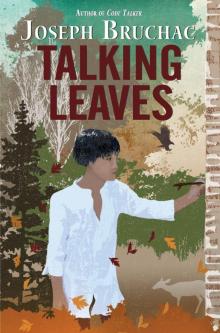 Talking Leaves
Talking Leaves Found
Found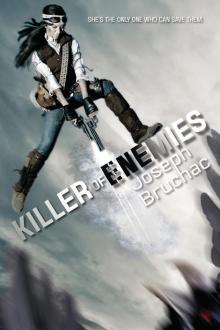 Killer of Enemies
Killer of Enemies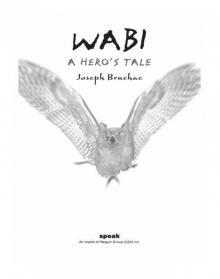 Wabi
Wabi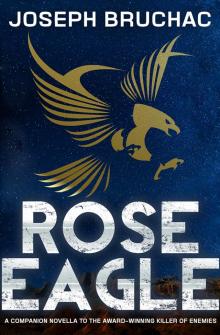 Rose Eagle
Rose Eagle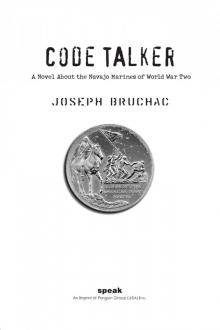 Code Talker
Code Talker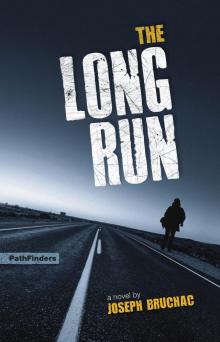 The Long Run
The Long Run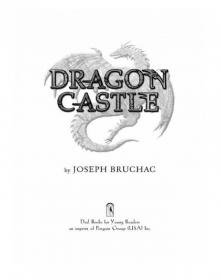 Dragon Castle
Dragon Castle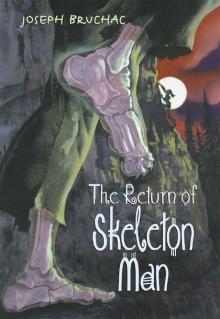 The Return of Skeleton Man
The Return of Skeleton Man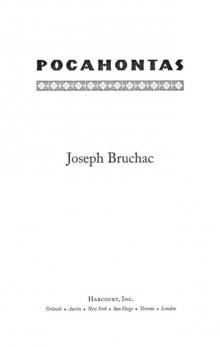 Pocahontas
Pocahontas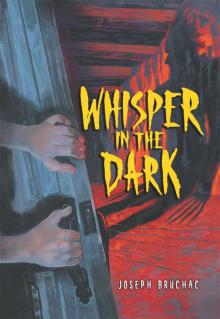 Whisper in the Dark
Whisper in the Dark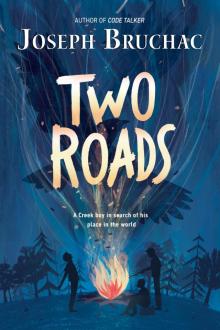 Two Roads
Two Roads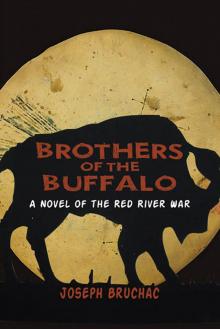 Brothers of the Buffalo
Brothers of the Buffalo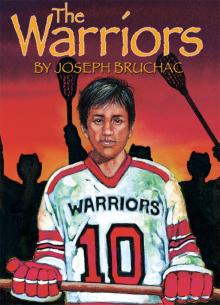 The Warriors
The Warriors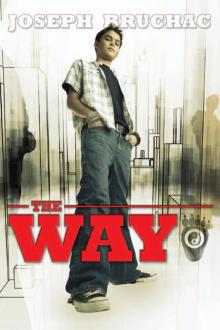 The Way
The Way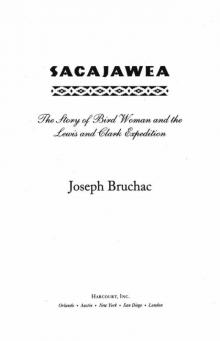 Sacajawea
Sacajawea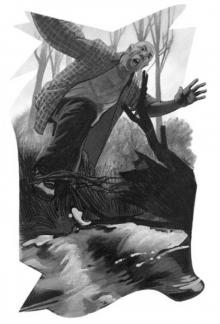 Night Wings
Night Wings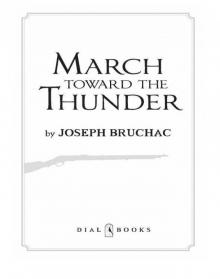 March Toward the Thunder
March Toward the Thunder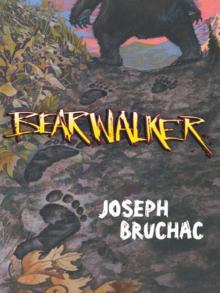 Bearwalker
Bearwalker Skeleton Man
Skeleton Man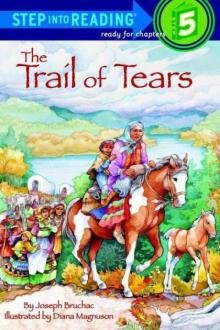 The Trail of Tears
The Trail of Tears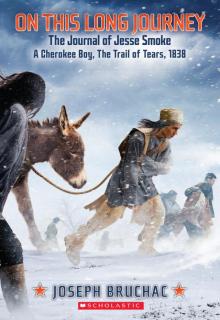 On This Long Journey
On This Long Journey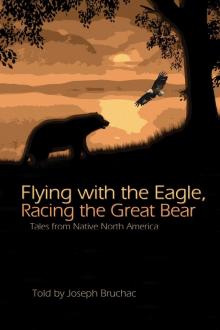 Flying with the Eagle, Racing the Great Bear
Flying with the Eagle, Racing the Great Bear